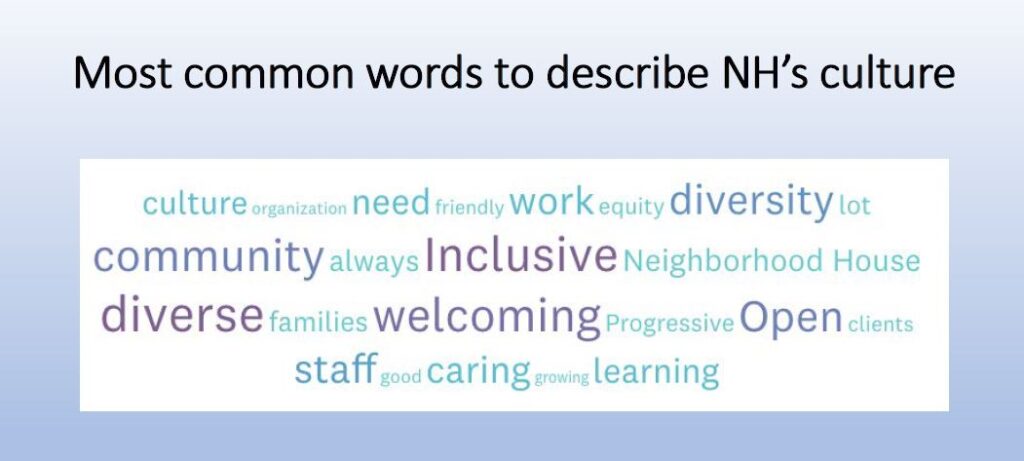Neighborhood House has been engaged in a multi-year effort to identify key racial equity goals and actions to move the organization towards becoming a fully inclusive, anti-racist, multi-cultural organization in a transformed society. As a part of this effort, we committed to implementing an organizational assessment to establish a baseline understanding of the current state of racial equity and social justice work here at the agency. In the spring of 2021, we conducted this assessment in survey form to gather feedback from both internal and external audiences – this summary will focus on responses from staff members, with subsequent articles covering responses from the communities we serve, managers, and our board of directors.
The survey assessments were developed in collaboration with Neighborhood House’s Anti-Racism Challenge Team (ACT) and the Racial Equity Action Lab (REAL). Special thanks to REAL for their analysis below.
113 staff members responded to the Racial Equity Organizational Assessment survey across all agency departments, with varying lengths of time working at Neighborhood House ranging from one year to more than ten years. Participation of staff holding racially marginalized identities was 62%. Additionally, 23% of staff identified as part of the LGBTQ+ community; 33% identified as an immigrant or a refugee; and 36% said English was not their primary language.
The assessment found that staff are largely happy working at Neighborhood House, with 90% of respondents indicating that they would recommend Neighborhood House as a place of employment for their friends and family. Additionally, staff survey respondents recognized and celebrated the steps Neighborhood House has taken in recent years to explicitly acknowledge and advance work around racial equity and social justice.
“My supervisor and department manager are both outspoken about anti-racist work being central to Neighborhood House work.”
While staff largely agree that Neighborhood House is heading in the right direction, survey results and supplementary written comments articulated a desire for this work to be supported and sustained over the long term. Staff expect accountability and progress in this work and Neighborhood House is committed to continuing to communicate its progress and creating opportunities for staff at all levels to be involved.
Importantly, the survey results demonstrated differences in agreement across racial identities. When asked if the agency has allocated resources (time/money) to advance racial equity and social justice in the organization, 80% of BIPOC respondents indicated agreement with this statement compared to 90% of white respondents – a 10% gap. When asked if the agency’s culture invites concerns about racial dynamics to be shared and addressed without fear of retaliation, 77% of BIPOC respondents indicated agreement with this statement compared to 83% of white respondents – a 6% gap. While most respondents generally indicated agreement across the survey, we can apply a racial equity analysis to better understand how these results amplify the unique experiences of BIPOC staff at NH compared to white staff.
“Some management staff seem to be committed others I am unsure how deep their analysis or commitment is.”
The written comments also showed significant variance in the implementation of this work across Neighborhood House’s departments, teams, and hierarchies. Staff survey responses indicated notable uncertainty regarding specific agency policies, practices, and processes that advance racial equity and social justice for staff and clients. These are concerns that Neighborhood House has been actively working on through increased capacity with the recent hiring of the Director of Inclusion Diversity, Equity, and Access as well as the establishment of ACT, in order to monitor and provide accountability to efforts and conversations around racial equity.
Finally, staff recognize that Neighborhood House’s senior leadership is predominately made up of people holding white identities, which does not align with the makeup of the agency’s overall workforce and clientele. Examining survey results and written comments indicated a desire for more opportunities to provide professional development and promotions into senior leadership for BIPOC staff members – another area the agency openly acknowledges and is working to create strategies and actions in order to provide leadership development for BIPOC staff and grow the agency’s leadership team from within.
“I have never worked for any organization so transparent and committed to issues of racial equity. I am very proud to be an employee of Neighborhood House!”
For our first Racial Equity Self Assessment, we acknowledge we have much work to do as well as much to proud of. Staff cited the Anti-Racism Challenge Team, the Affinity Groups, and investments we’ve made to elevate the racial equity and social justice analysis and initiatives. We look forward to continuing on this journey together to become a fully inclusive, anti-racist, multicultural organization in a transformed society.
Staff members can view the full report we shared last month here on our internal drive.

